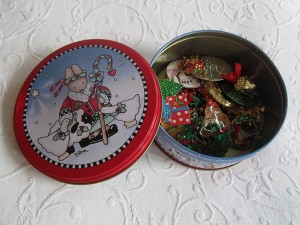Every family has its special holiday traditions and customs, from favorite foods to must-do celebrations. Christmas trees are adorned with unique homemade ornaments, scruffy from years of use, and the same well-worn household decorations come out year after year. Lifted out of tattered storage boxes, they bring a fresh thrill each December.
When it comes time to put away our family’s Christmas things, I always leave two items for LIFO (last-in, first-out): my giant canister of holiday cd’s, and the tin of holiday necklaces, earrings, and broaches. After December 1st, it’s only Christmas music at our house, and it’s holiday “jewelry” every day.
When the kids were little, they argued over who would wear which of the pins and trinkets in the jewelry tin, some of them crudely made by pudgy fingers in kindergarten. But for years now, my grown children haven’t cared to wear them, so I’ve been the only one dipping into the tin. That is until this year. Suddenly my old Christmas baubles have taken on new life in the hands of my grands.
Skylar in particular has been fascinated with their “beauty,” and Nicholas has been concerned over the “pokey’s” on the broaches, wanting each one safely clasped. Last Sunday I pleased them all by wearing the biggest broach, a red ceramic “Noel” pin 5” long that included a chunky poinsettia.
But while bending down to hug a child after church, I heard a crack and realized I’d pressed him up against the broach. “Ouch!” he said, and pulled away, looking up at me.
“Oh my!” I said. “I think I hugged you into my pin!”
We rubbed his head, and he skipped off to get a Christmas cookie. That night when I went to remove the broach and put it away, I realized the crack I’d heard hadn’t been a child’s head at all but the snapping of the broach in half. When I took it off, it simply said, “No” instead of “Noel.” Eventually I went back to church to hunt for the “el” but never found it.
The word “noel” has become synonymous with Christmas, but originally it meant birth or day of birth. That’s where our Christmas carol The First Noel got its story-line: “Noel, noel, born is the King of Israel.”
But what about the “el?” It’s definition is a good one: the name of God as strength, might, power, sovereignty. “El” is used hundreds of time in Scripture, often coupled with more descriptive words that detail God’s character: El Emet (God of truth), El Olam (everlasting God), El De’ot (God of knowledge), El Hakkavod (God of glory), and many more.
And on Sunday I lost my “EL!”
But what a glorious miracle to know that throughout my lifetime, my real EL cannot be lost, because I will never say NO to EL Chaiyai, “The God of my life.”
“By day the Lord commands his steadfast love, and at night his song is with me, a prayer to the God of my life (El Chaiyai)” (Psalm 42:8)








